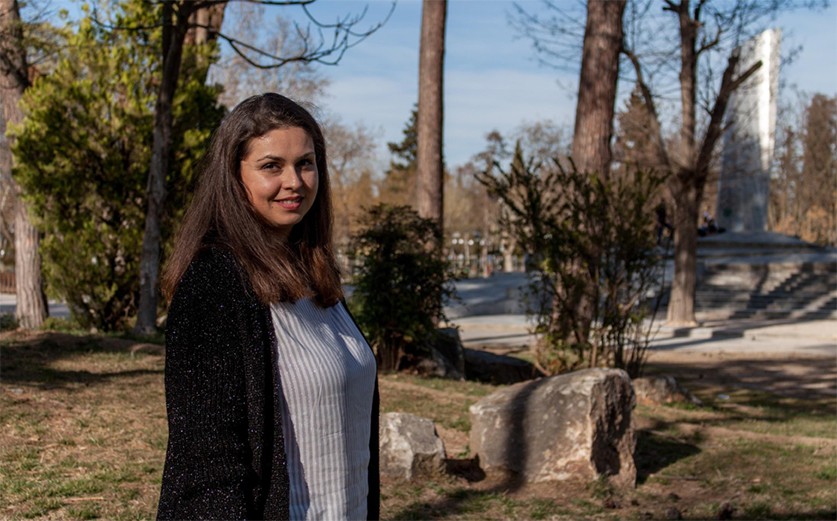Meet Anastasia
Anastasia Dimitriadou, 34, was born in Orestiada, Evros, and lives in Larissa. She is a beneficiary of the apiculture training seminars implemented by the Agricultural University of Athens (AUA) as part of the “New Agriculture for a New Generation” (NANG) program. She attended high school at the American Farm School for the first two years and graduated from the 1st High School of Orestiada. Later, she studied the Management of Tourism and Hospitality Businesses at the Alexander Technological Educational Institute (TEI) of Thessaloniki. After graduating, she returned to Orestiada to work at her family’s hotel. In June 2017, she moved to Larissa when her husband, a police officer from Larissa, took a transfer back to his hometown.
Participating in the Apiculture Program
“When I first started, I didn’t know anything about beekeeping,” Anastasia said. “I couldn’t tell a bee from a wasp!” She became interested in natural food products while raising her children, a daughter, now 9, and a son, 5. “I discovered that the best products for kids are natural, and that’s how I got into beekeeping,” she said. “Propolis, royal jelly, and honey are like natural medicines. I want to make different bee products to sell and for my family. I hope it can become my full-time job.”
Anastasia found out about the apiculture program through a Facebook group for beekeepers in Larissa. “It was like fate,” she said. “When I decided that I wanted to get into beekeeping, here came the seminar.” The first four-day seminar, held in February from 9.00 to 14.00 each day, taught Anastasia and the other participants the basics of beekeeping, such as how to set up and paint a hive so that it lasts for 40-50 years. The 20 participants spent half their time inside the lecture hall learning theory and the other half outside doing practical training in the field. They also had the opportunity to meet some professional beekeepers from Larissa. “It was so helpful to have Professor Harizanis and Dimitris walk us through every step from the beginning,” Anastasia said. “I didn’t want the seminar to end!”
Most of the participants don’t have hives yet, though some of the participants have family background in beekeeping. They each received a textbook written by Harizanis that details everything they need to know about beekeeping as well as access to notes, internet resources, and over 55 instructional videos created by Harizanis and his lab. “I’m reading constantly,” Anastasia said. “But the life of the bees is so interesting that you want to learn everything.” She told me how even a bee’s sting has health benefits and can be used in certain therapies for patients who have blood circulation issues. “I’m not afraid of getting stung,” she said. “The queen bee releases a pheromone that makes all the worker bees gather around her, and if you smear that pheromone on yourself, the bees will swarm you. I’m a little afraid of that, but otherwise, I don’t have a problem with them.”
After the first seminar, she showed one of the bee videos to her children and husband. “My little son was fascinated,” she said. “I think that beekeeping is something I can teach my kids, something we can all do together, just like Dimitris was taught beekeeping by his father and grandfather.” After the March seminar, Anastasia will buy her first two beehives. “My husband and I found the perfect place to keep my hives. It’s in the village, not far from our house, in a place surrounded by trees,” she said. “My husband wants to buy hives now, but I want to wait until after the next seminar to make sure I have all the information I need to get started. My children are giving their input on what color they want to paint them. It’s a family effort.”

